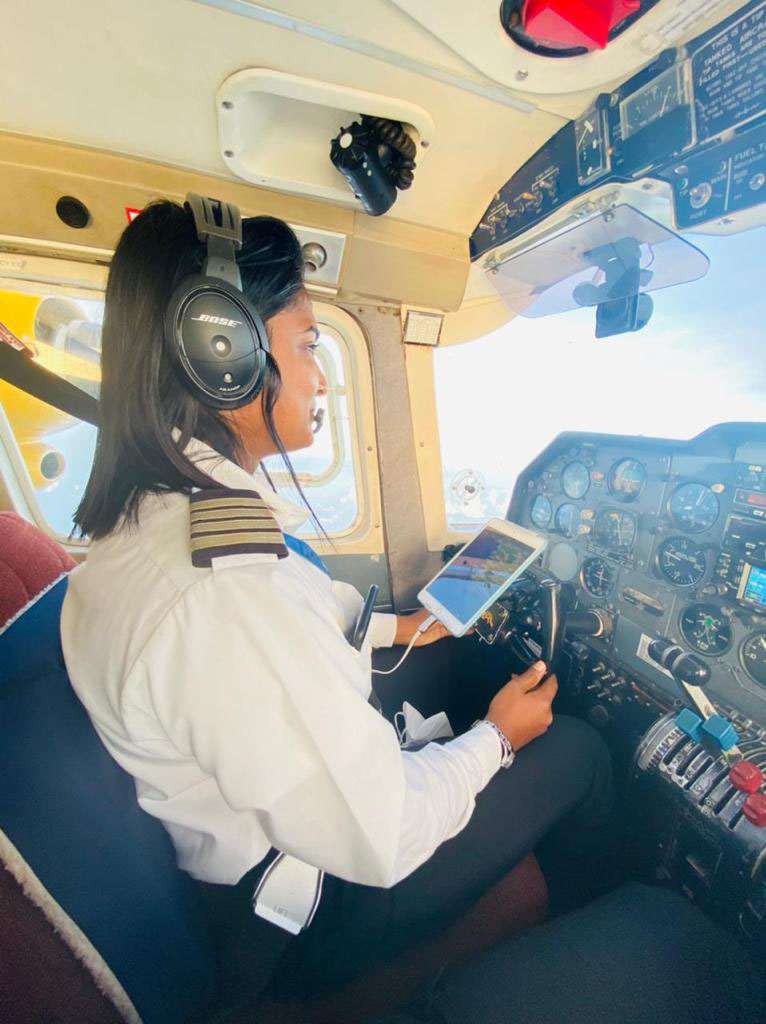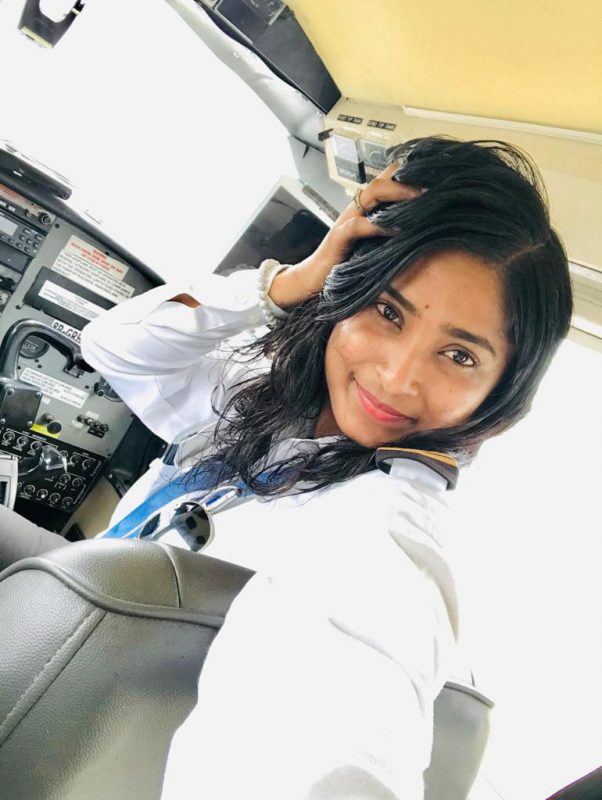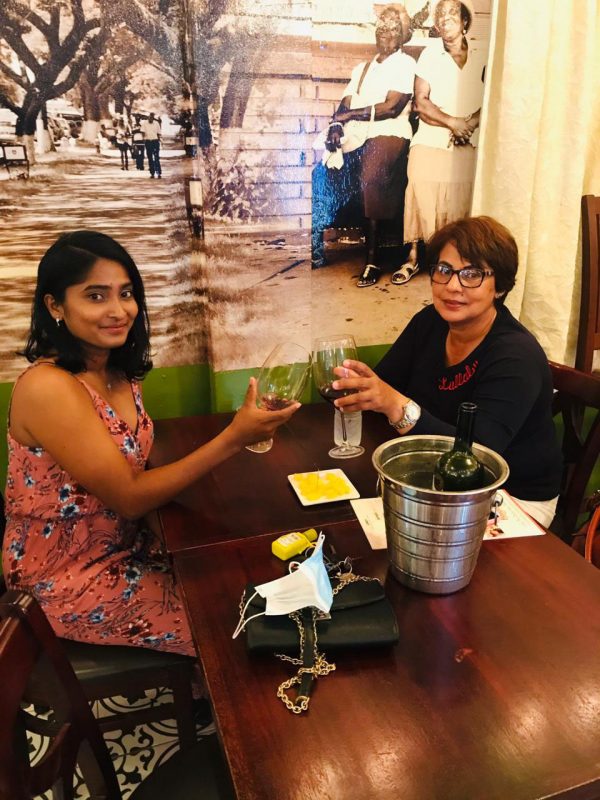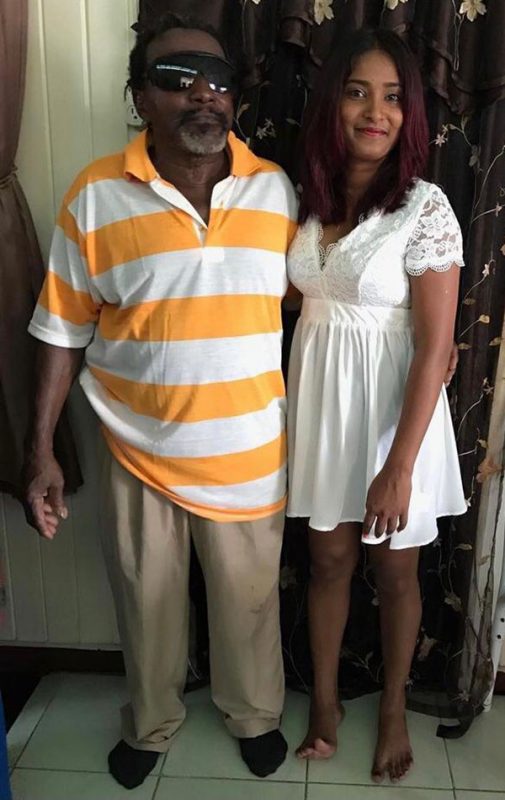Captain Shelly Dookram has been a pilot for two years, and she vividly remembers being a little girl, watching planes take off from the Eugene F Correia (then Ogle) Airport and knowing that she wanted to fly them. Her family was poor, but somehow the dream was sustained and became a reality.
Over the last two years, she has flown planes to and from the interior. She has also done a number of medevac flights, which give her much purpose and satisfaction. When Dookram spoke with this newspaper, she had been preparing to pilot a repatriated flight to Trinidad taking passengers who had arrived in Guyana from the United States as the T&T borders are closed to commercial flights.
At present she is employed with Roraima Airways. However, getting to where she is today was not all sunshine and roses. She had found it extremely difficult to get a job after she completed her training and was forced to settle for one in an office in the International Standard Organization field. Later, she landed a job at a local airline company that is no longer in operation. Being a woman in an industry that is male dominated proved another challenge, she said, as persons wanted to take advantage of her. She subsequently left that company and afterward landed a job with Roraima Airways in 2019.
One of her biggest supporters and mentors is Captain Feriel Ally of Trans Guyana Airways. “I have known her for quite some time and had always wanted to be like her one day. She breaks a lot of barriers and gives the guys a run for their money,” Dookram said.
“For me, walking into a room filled with guys gives me a sense of pride and accomplishment. If I can inspire one person, that will be a huge accomplishment for me.”
Another of her biggest supporters is her grandfather. She said that without him, she would not be where she is today.
Abandoned
Dookram was only a baby when her young mother abandoned her. She was found by her grandfather who took her in, and he and her grandmother raised her as their own. Dookram confided that for many years, she hated the woman who had given birth to her for leaving her, but as she got older, she realized the dilemma her mother had faced being too young and unable to take care of herself, much less a new baby.
Her mother, she said, subsequently went on to have two other children, but they were raised by an aunt after she was murdered. Her grandmother, she noted, was mentally disturbed by her mother’s murder, so much so that she had to be placed on treatment. Dookram’s father, who had cancer, succumbed to it not long after.
“Growing up, I was very poor so there wasn’t much I could dream of. I lived in Cummings Lodge with my grandparents. Where I lived, wasn’t far from the Ogle Airport so I could see the planes taking off. I knew I wanted to be a pilot but knew we couldn’t afford it, so I pushed it to the back of my mind,” she said.
Dookram attended Graham’s Hall Primary School and Brickdam Secondary. There were days, she recalled, when she went to school without lunch because there was no money. There was also no money for textbooks, though her grandfather sacrificed a lot to provide her with the best he possibly could. Upon completing secondary school, she had hoped to attend university, but knew she needed to be patient. Because there was no one she could rely on financially, she got a job. She subsequently enrolled at the University of Guyana and with what she earned, and financial help from her grandfather and an aunt living abroad, she was able to complete her Diploma in Computer Science.
Taking flight
This led to her securing a job at Air Services Limited, then later at Aurora Gold Mines for two years. It was while working with the former in 2014 that she first got on a plane. It was a caravan aircraft flown by Captain Chris King to and from Kaieteur Falls. Though a passenger, Dookram had the opportunity to sit in the co-pilot’s seat. “That inspired me to be front and centre to see where all the magic happens,” she said.
Over the years, Dookram had been saving much of her earnings and she realised she had a decision to make. Should she buy a house? Or should she follow her dreams? She decided to go with the latter.
After researching flight schools, Dookram applied to five of them in the United States and was accepted at all of them. She chose to attend ATP Flight School at Daytona Beach, Florida. Once she took up their offer, she had a student counsellor assigned to her who guided her in filling out her paperwork, financial documents and applying for a student visa at the US Embassy. Dookram graduated from flight school in 2018.
She shared that while she was studying in Florida, she and the other women in her class gained respect from their male peers for choosing to join the industry. The same could not be said upon her return to Guyana. “In the aviation world, there are a lot of challenges going into a field dominated by men. There are some really good male pilots that give you that boost and encouragement and there are others who want to see you fail. I had to find that inner strength,” she shared.
Dookram served as a co-pilot for 15 months, then in January of this year she was promoted to captain. “It’s a different ball game being the captain. You always have to think what next should there be an emergency. You’re in the hot seat. But when you’re the co-pilot, it’s the captain who deals with emergencies and you as the co-pilot just really sit there,” she explained.
Her first flight as a captain saw her transporting officials from the Ministry of Public Works to Phillipai, Cuyuni/Mazaruni. According to her, it is not common for women to be released to do their first flights in the interior. Usually, women are released to do international flights. The Phillipai area, she noted, is terraneous and the pressure was on, but she managed well.
Phillipai is not the most challenging terrain Dookram has had to handle. She spoke of having to land at Gunns Airstrip in Region Nine (Upper Takutu-Upper Essequibo). Not only is the area terraneous but the airstrip is only 1,800 feet long, she said. In addition, when it gets wet, the airstrip needs at least two days to dry, or a plane could get stuck.
These difficult places to land, she noted, often are the ones with the most breath-taking sceneries. “Karasabai [in Region Nine] is a favourite interior place to go. It’s picture perfect; there’s a lot of mountains,” she said.
Roraima Airways, she pointed, out also provides flights and charters to and from Trinidad, Barbados, St Vincent and the Grenadines, and other Caribbean islands. As it relates to the current volcanic disaster in St Vincent, Dookram said the airline has a flight on standby. However, because the airport is covered in volcanic ash and soot, no one is allowed to fly in or out.
Aside from being a pilot, Dookram is vice-president of the Guyana Pilots Association. The association has 60 members inclusive of army pilots. Five members of this body are women; two are captains – Dookram and Captain Ally, who is also president of the association – while the other three are co-pilots.
In her free time, Dookram likes spending time with her cats, Luna and Oscar, both of whom are rescues.
Today the captain has a new goal; she plans to someday fly commercial aircraft. Considering her challenges, the pilot admonishes others, “Don’t give up even if it seems impossible. It seemed impossible for me at one point but here I am today. A miracle can happen.”









